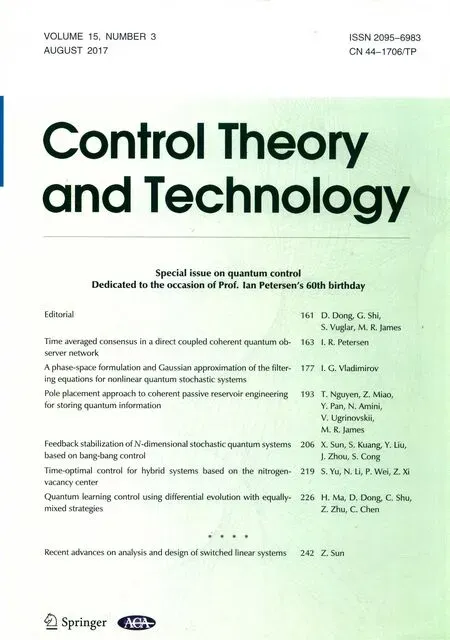Special issue on quantum control Dedicated to the occasion of Prof.Ian Petersen’s 60th birthday
Special issue on quantum control Dedicated to the occasion of Prof.Ian Petersen’s 60th birthday
Quantum technology is recognized as one of the most promising directions for our future technologies.By exploiting the unique features of quantum effects,emerging quantum technology is rapidly progressing around the world including quantum computation,quantum communication,quantum metrology and quantum simulation.The development of quantum control plays a grounding role in enabling the preservation and manipulation of quantum states that are used in various quantum technologies.This special issue will focus on new development in relevant topics of estimation and control methods in quantum systems,and provide a forum for idea exchange in this dynamic research area.Particularly,Ian R.Petersen,a key figure in the development of robust and quantum control theory,just turned 60 in the past year.We propose to celebrate this occasion with this special issue on quantum control,one of his main research focuses in the last fifteen years.
Ian Petersen was born in Victoria,Australia in 1956.Ian attended the University of Melbourne,and was awarded the B.E.degree in Electrical Engineering.Subsequently he won a prestigious Fulbright Scholarship to pursue his studies in Electrical Engineering at the University of Rochester,USA,from where he received the Ph.D.degree in 1984.From 1984 to 1985 he was a Postdoctoral Fellow at the Australian National University.In 1985,he joined the University of New South Wales at the Australian Defence Force Academy where he held a Scientia Professorship,an Australian Research Council Federation Fellowship and an Australian Research Council Laureate Fellowship,in the School of Engineering and Information Technology.In 2017 Ian returned to the Australian National University,and now holds a Professorship in the Re
search School of Engineering.Ian is a Fellow of the IEEE,a Fellow of IFAC,and a Fellow of the Australian Academy of Sciences.He has served as an Associate Editor for the IEEE Transactions on Automatic Control,Systems and Control Letters,Automatica,and SIAM Journal on Control and Optimization.Currently he is an Editor for Automatica,and an Associate Editor of IEEE Transactions on Control Systems Technology.
Ian’s principal research interests are in robust control theory and quantum control theory.In the 1980’s Ian made seminal contributions to robust control theory with far reaching implications.Ian showed how to employ a Riccati equation approach to problems of disturbance attenuation.This enabled time domain methods to be applied to the fundamental problem of robust H-infinity control for the first time.These efforts had an enormous impact,resulting in numerous significant new developments in the field.The legacy of Ian’s innovations is widespread and now part of standard software tools.More recently Ian helped develop negative imaginary systems theory.His results provide a framework for the robust control of flexible structures,and extend and complement passivity theory.In the early 2000s Ian collaborated on research in the emerging field of quantum control theory,which led to seminal contributions concerning linear and coherent quantum systems theory.These results enable the systematic design of fully quantum feedback systems that achieve robust stability specifications.Today Ian is an influential senior figure in the world-wide systems and control community,and continues to make significant contributions to quantum control theory and negative imaginary systems.
This special issue contains a set of new contributions to the modelling and analysis of quantum dynamics,networking ideas for large-scale quantum systems,and new quantum control approaches ranging from pole placement,optimal control design,and quantum learning control.These contributions are summarized as follows.

?2017 South China University of Technology,Academy of Mathematics and Systems Science,CAS,and Springer-Verlag Berlin Heidelberg
 Control Theory and Technology2017年3期
Control Theory and Technology2017年3期
- Control Theory and Technology的其它文章
- Recent advances on analysis and design of switched linear systems
- Quantum learning control using differential evolution with equally-mixed strategies
- Time-optimal control for hybrid systems based on the nitrogen-vacancy center
- Feedback stabilization of N-dimensional stochastic quantum systems based on bang-bang control
- Pole placement approach to coherent passive reservoir engineering for storing quantum information
- A phase-space formulation and Gaussian approximation of the filtering equations for nonlinear quantum stochastic systems
